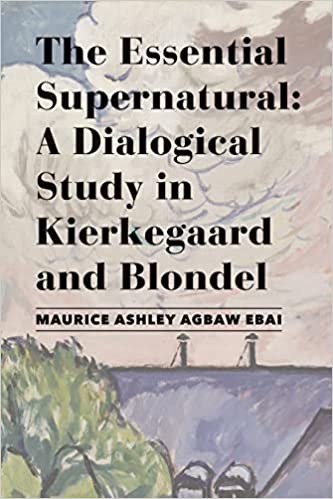The Essential Supernatural
By Father Maurice Ashley Agbaw-Ebai
Publisher’s Synopsis
Søren Kirkegaard and Maurice Blondel are positioned together in a dialogue regarding the vision of the supernatural. Maurice Ashley Agbaw-Ebai draws from this a sharper image of the preeminent place religious experience possesses in human life and thought. Kirkegaard’s lament of Christian lack of fervor and Blondel’s concern that religion and philosophy no longer interact are both examined and Agbaw-Ebai concludes that they both indicate the same outcome: a “dominant leveling of society” that robs religion of its particularity. This devastates the individual because he is no longer challenged to seek a relationship with God and expose himself to the supernatural. The boundlessness of man must be acknowledged or else his actions will never be understood, and religious experience and philosophy must coexist with mutual reference or self-knowledge will never amount to the discovery of supernatural destiny. And this, asserts Agbaw-Ebai, is the shared urgency of both Kirkegaard and Blondel.
Like these philosophers who have preceded him, Agbaw-Ebai exhorts us to never allow the sense of our relation to the supernatural as a settled matter. The philosophy of religion we have inherited does not protect us from having to confront our own subjectivity with autonomy: to be God without God and against God, or to be God with and through God.
Praise for The Essential Supernatural
Plato wrote that truth is best seen in dialog, when two minds meet and sparks of truth flame out as from the contact between flint and steel. This is especially true when there are both strong agreements and strong differences between those two minds. This scholarly comparison of Kierkegaard and Blondel fits that model well. The differences are at first stark: Kierkegaard was strongly Protestant, Blondel was strongly Catholic; Kierkegaard focused on choice, Blondel on action; Kierkegaard is usually classified as an “existentialist,” Blondel as a “personalist” or a “phenomenologist.” What holds them together at their center? Not that both were philosophers, or that both were Christians, or that both happened to be both philosophers and Christians, but that both were Christian philosophers, whose center was Christ, and therefore both God and man, His image.
Peter Kreeft, Professor of Philosophy, Boston College
Fr. Maurice helps us to see how these two very different personal temperaments and philosophical methods meet and see a similar light, not despite their divergence but in and because of it. I found this work surprising and enlightening, and I found Fr. Maurice to be a reliable, sympathetic, and trustable guide through both of these challenging thinkers.
To call a philosopher “challenging” is often a negative euphemism for “difficult to comprehend.” But in this case it is not negative but positive. Like Jesus and Socrates, both Kierkegaard and Blondel “challenge” us to a duel–a duel not with them but with some of our easiest and laziest assumptions about the intrinsic dynamism and restlessness of our very selves. This book should come with gentle warning labels to those who dislike that kind of challenge.
